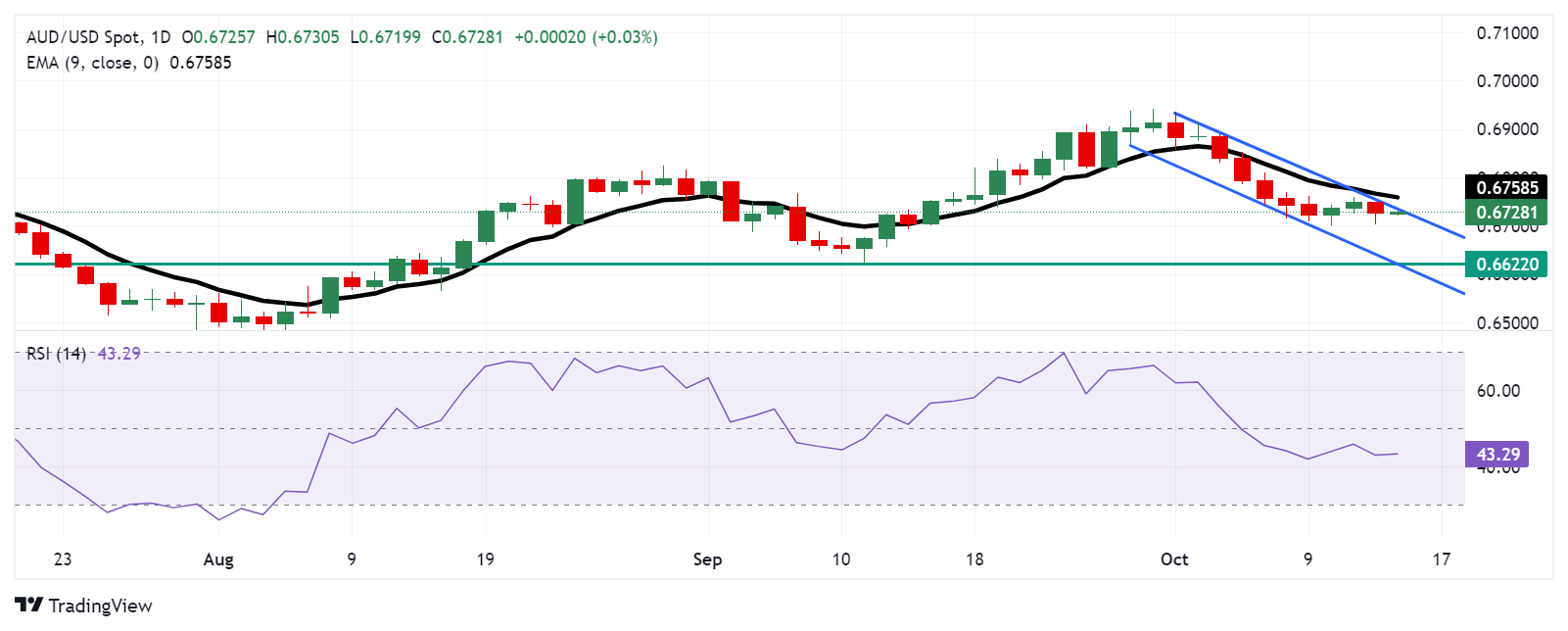Australian Dollar receives downward pressure from economic uncertainty in China
- Gold jumps over 2% toward $5,400 after US, Israel attack Iran
- Strait of Hormuz Blockade: JPM Warns Crude Production May Halt After 25 Days. How Will US-Iran Conflict Trajectory Affect Global Oil Prices?
- Gold rises to near $5,200 amid US tariff uncertainty, US PPI data in focus
- Gold gains above $5,150 as US tariff uncertainty drive demand, eyes on US-Iran talks
- Oil prices rise as US and Iran extend talks into next week
- WTI Price Forecast: Retreats from seven-month top, still well bid near $71.00 mark

The Australian Dollar depreciated as China's fiscal stimulus plan failed to boost the market sentiment.
The ANZ-Roy Morgan Consumer Confidence index remained steady at 83.4 this week.
The US Dollar receives support from the fading likelihood of further bumper rate cuts by the Fed.
The Australian Dollar (AUD) remains subdued against the US Dollar (USD) on Tuesday, weighed down by weak trade balance data from China, Australia's largest trading partner, released on Monday. Furthermore, China's fiscal stimulus plan, announced over the weekend, failed to boost the Aussie Dollar, as investors were left uncertain about the scale of the package.
The Australian weekly survey of Consumer Confidence showed little movement, with the ANZ-Roy Morgan Consumer Confidence index remaining steady at 83.4 this week. Despite the unchanged figure, the longer-term trend shows that Consumer Confidence has been below the 85.0 mark for a record 89 consecutive weeks. The current reading is 1.3 points higher than the 2024 weekly average of 82.1.
The US Dollar (USD) gains support from increasing expectations that the US Federal Reserve (Fed) will avoid aggressive interest rate cuts. According to the CME FedWatch Tool, markets are currently pricing in an 83.6% probability of a 25-basis-point rate cut in November, with no anticipation of a larger 50-basis-point reduction.
Daily Digest Market Movers: Australian Dollar remains subdued over economic woes in China
Federal Reserve (Fed) Bank of Minneapolis President Neel Kashkari reassured markets late on Monday by reaffirming the Fed's data-dependent approach. Kashkari reiterated familiar Fed policymaker views on the strength of the US economy, noting continued easing of inflationary pressures and a robust labor market, despite a recent uptick in the overall unemployment rate, per Reuters.
The AUD might have received downward pressure from a detailed note from the Commonwealth Bank of Australia indicating expectations that the Reserve Bank of Australia (RBA) will implement a 25 basis point rate cut by the end of 2024. The report suggested that a stronger disinflationary trend than the RBA anticipates is essential for the Board to consider easing policy within this calendar year.
The risk-sensitive AUD/USD pair might have received downward pressure due to escalating tensions in the Middle East that have sparked concerns of a broader regional conflict. According to CNN, at least four Israeli soldiers were killed, and over 60 people were injured in a drone attack in north-central Israel on Sunday.
China's military initiated drills in the Taiwan Strait and around Taiwan on Monday. A spokesperson for the US Department of State expressed serious concern regarding the People's Liberation Army's (PLA) military actions. In response, Taiwan's Defense Ministry stated, “We will not escalate conflict in our response.”
The National Bureau of Statistics of China reported that the country's monthly Consumer Price Index (CPI) remained unchanged at 0% in September, down from August's 0.4% increase. The annual inflation rate rose by 0.4%, falling short of the anticipated 0.6%. Additionally, the Producer Price Index (PPI) decreased by 2.8% year-on-year, a larger drop than the previous decline of 1.8% and exceeding expectations of a 2.5% decrease.
On Saturday, the National People’s Congress expressed an optimistic outlook following a briefing from China’s Ministry of Finance (MoF). The MoF emphasized key priorities focused on stabilizing the property market and tackling local government debt issues. The ministry indicated that special bonds would be issued to support both bank recapitalization and efforts to stabilize the real estate sector.
Chicago Fed President Austan Goolsbee spoke to Bloomberg, commending the progress on inflation and the labor market. Goolsbee noted that despite the positive jobs report for September, there are no indications of overheating in the economy.
Last week, the Reserve Bank of Australia released the Minutes from its September monetary policy meeting, suggesting that board members examined potential scenarios for both lowering and raising interest rates in the future. The discussion indicated that future financial conditions may need to be either tighter or looser than current levels to meet the Board's objectives.
Technical Analysis: Australian Dollar remains below 0.6750 within the descending channel
The AUD/USD pair hovers around 0.6730 on Tuesday. Technical analysis of the daily chart shows the pair testing the upper boundary of a descending channel pattern. A successful breakout above this level could signal a shift in momentum from bearish to bullish. However, the 14-day Relative Strength Index (RSI) remains below the 50 mark, indicating that bearish momentum remains.
Suppose the AUD/USD pair breaks above the descending channel. In that case, it may encounter initial resistance at the nine-day Exponential Moving Average (EMA) around the 0.6758 level, followed by the key psychological resistance at 0.6800.
On the downside, the AUD/USD pair may target the lower boundary of the descending channel near the 0.6630 level, with further support at its eight-week low of 0.6622, last recorded on September 11.
AUD/USD: Daily Chart
Read more
* The content presented above, whether from a third party or not, is considered as general advice only. This article should not be construed as containing investment advice, investment recommendations, an offer of or solicitation for any transactions in financial instruments.





